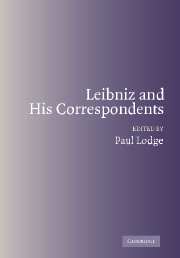Book contents
- Frontmatter
- Contents
- Contributors
- Abbreviations
- Acknowledgments
- 1 Introduction
- 2 Leibniz and His Master: The Correspondence with Jakob Thomasius
- 3 A Philosophical Apprenticeship: Leibniz's Correspondence with the Secretary of the Royal Society, Henry Oldenburg
- 4 The Leibniz–Foucher Alliance and Its Philosophical Bases
- 5 Leibniz to Arnauld: Platonic and Aristotelian Themes on Matter and Corporeal Substance
- 6 Leibniz and Fardella: Body, Substance, and Idealism
- 7 Leibniz's Exchange with the Jesuits in China
- 8 Leibniz's Close Encounter with Cartesianism in the Correspondence with De Volder
- 9 “All the time and everywhere everything's the same as here”: The Principle of Uniformity in the Correspondence Between Leibniz and Lady Masham
- 10 Idealism Declined: Leibniz and Christian Wolff
- 11 On Substance and Relations in Leibniz's Correspondence with Des Bosses
- 12 “[…] et je serai tousjours la même pour vous”: Personal, Political, and Philosophical Dimensions of the Leibniz–Caroline Correspondence
- References
- Index
5 - Leibniz to Arnauld: Platonic and Aristotelian Themes on Matter and Corporeal Substance
Published online by Cambridge University Press: 02 September 2009
- Frontmatter
- Contents
- Contributors
- Abbreviations
- Acknowledgments
- 1 Introduction
- 2 Leibniz and His Master: The Correspondence with Jakob Thomasius
- 3 A Philosophical Apprenticeship: Leibniz's Correspondence with the Secretary of the Royal Society, Henry Oldenburg
- 4 The Leibniz–Foucher Alliance and Its Philosophical Bases
- 5 Leibniz to Arnauld: Platonic and Aristotelian Themes on Matter and Corporeal Substance
- 6 Leibniz and Fardella: Body, Substance, and Idealism
- 7 Leibniz's Exchange with the Jesuits in China
- 8 Leibniz's Close Encounter with Cartesianism in the Correspondence with De Volder
- 9 “All the time and everywhere everything's the same as here”: The Principle of Uniformity in the Correspondence Between Leibniz and Lady Masham
- 10 Idealism Declined: Leibniz and Christian Wolff
- 11 On Substance and Relations in Leibniz's Correspondence with Des Bosses
- 12 “[…] et je serai tousjours la même pour vous”: Personal, Political, and Philosophical Dimensions of the Leibniz–Caroline Correspondence
- References
- Index
Summary
In many essays over a large number of years, Leibniz attacked the Cartesian doctrine that extension constitutes the essence of a substance. In some of these essays, he, nonetheless, advocated a doctrine of corporeal substance, although, perhaps, his enthusiasm for it flagged as the years went on. In the letters he wrote to Arnauld, between 1686 and 1690, both the critical attack and Leibniz's own account of bodily substance are prominent. At this stage, he was presenting this theory of substance to a truly formidable critic, perhaps for the first time. He did not insist that it is true, but he did set himself up to explain what the theory is: given that no substance could be merely extended, what would be required for a substance to be corporeal? Substantial forms, in a word. Arnauld immediately raised a couple of central questions. As the correspondence proceeded, he learned more about Leibniz's proposal, but he kept coming back to these two central points. The strategy of this chapter is to exploit the fact that Leibniz's responses occur in the context of this ongoing dialogue. Each letter of Leibniz can – I would say, must – be understood in light of the ground covered in previous letters. The mutual understanding built up between the two is directly relevant to an appreciation of the force of Arnauld's final queries and the demands they make on his correspondent. Any extended exchange between philosophers uniquely creates this sort of interpretive resource.
- Type
- Chapter
- Information
- Leibniz and his Correspondents , pp. 97 - 122Publisher: Cambridge University PressPrint publication year: 2004
- 5
- Cited by

